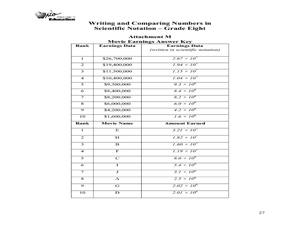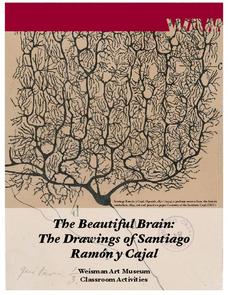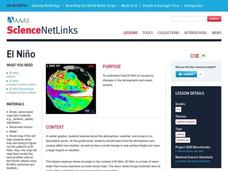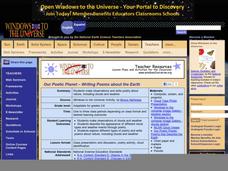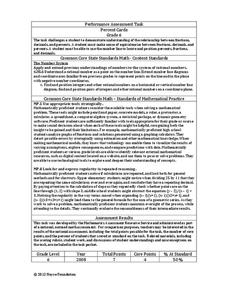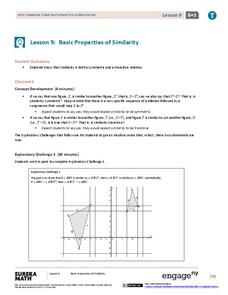Curated OER
Candy Machine
Using the concept of a candy vending machine, young mathematicians explore the sugar ratios found in different types of candy. Using the provided information, class members calculate and compare different ratios in order to find the...
Colorado State University
Can You See Beyond the Rainbow?
There's more to light than ROYGBIV! An enlightening laboratory investigation has learners explore the world of infrared light. When they use goggles that take away visible light, they experience how things look with only infrared light.
Curated OER
Measures of Central Tendency Using Scientific Calculators
Learners explore mean, median, and mode as they model mathematics in real-world problem situations. The instructional activity requires the use of the TI 30X IIS.
Ohio Department of Education
Writing and Comparing Numbers in Scientific Notation-Grade Eight
Explore scientific notation in this mathematics lesson plan. Young mathematicians explore multiple representations of large number in scientific notation through the use of models, visual representation and expanded form. The lesson plan...
Dig-It Games
Mayan Mysteries
Who is Ladrone? Join Fiona and Charlie as they accompany their Uncle Alex to Guatemala to help Chief Mateo determine the identity of the elusive Ladrone and solve Mayan mysteries. Players of this interactive game learn much about Mayan...
Council for the Curriculum, Examinations and Assessment
Managing Influences and Making Decisions
Internal and external factors influence behavior and decision making. The third session in a 10-lesson series focusing on Social, Physical, Emotional, Cognitive and Spiritual (SPECS) health explores the impact of these factors and...
Curated OER
Sphere Dressing
Geometric design makes a fashion statement! Challenge learners to design a hat to fit a Styrofoam model. Specifications are clear and pupils use concepts related to three-dimensional objects including volume of irregular shapes and...
NASA
Lights on the International Space Station
Groups explore illumination with NASA's Lighting Environment Test Facility (LETF) as a context. Using the TI-Nspire app, groups determine the lux equation that models their simulation. They then use the lux equation to solve problems...
LABScI
Vision Lab: The Eye
Our bodies have some amazing capabilities, but there are some limitations. Explore the limitations of the human eye through the eighth lab activity in a series of 12 biology lessons. Individuals measure their own peripheral vision and...
University of Minnesota
Beautiful Brain: Strangest Dream
Do words change or add meaning or interest to a work of art? The final lesson in a four-part series on the beautiful brain as a work of art focuses on art analysis. Scholars write a story about exploring art from the inside. Reflections...
Cornell University
Beam Focusing Using Lenses
Explore optics using an inquiry-based experimental approach! Young scholars use a set of materials to design and build a unit capable of focusing a beam of light. They experiment with different lenses to determine the best approach to...
Curated OER
Moebius Strips
Learners make Moebius strips and use them to demonstrate the interconnectedness of an environment. They explore the natural cycles (water, oxygen/carbon dioxide, carbon, nitrogen) within the environment. They describe how the cycles are...
Curated OER
Our Playground!
First graders observe and explore the playground's environment by walking around the playground, followed by a group discussion of what they observed. They then divide into groups and participate in centers, their brought back together...
Curated OER
Solar Arrays for the Space Station
Students explore the challenges that are faced when transporting materials into space. They review the various forms of energy, including solar arrays, that are used on the International Space Station and how generating this energy calls...
Curated OER
Move It!!!
Students explore motion by observing the movement of people and duplicating those movements. They compare and contrast various kinds of movements and identify different types of movements in pictures. They build an object that can be...
Curated OER
Putting the Pieces Together
Children explore fractions on a conceptual level by making individual quilt squares. Each student works with small paper swatches to divide them into pieces that represent a given fraction. The class is then separated into groups and...
Curated OER
El Nino
Explore the properties of water and the affects of El Nino. Middle schoolers will learn about the devastation an El Nino can cause as well as the definition of El Nino. Additionally, they will discover the cause of El Nino along with the...
Curated OER
Lesson: Elizabeth Peyton: The Self in the Other's Image: Portraiture and Identity
Art, identity, and an imaginary community, three components that should make for an interesting lesson. Critical thinkers explore and evaluate the work of contemporary artist, Elizabeth Peyton. They discuss her use of subject and art to...
Curated OER
Our Poetic Planet - Writing Poems about the Earth
As a way to combine language arts and science, try this lesson on writing cloud poetry. Begin by showing a PowerPoint presentation and images of cloud types. Take meteorology masters outdoors to explore the sky using the provided "Cloud...
Perkins School for the Blind
Conductors of Heat - Hot Spoons
Why is the end of a spoon hot when it's not all the way in the hot water? A great question deserves a great answer, and learners with visual impairments will use their auditory and tactile senses to get that answer. A talking...
California Mathematics Project
Reflections
Reflections are the geometric mirror. Pupils explore this concept as they discover the properties of reflections. They focus on the coordinates of the reflections and look for patterns. This is the third lesson in a seven-part series.
Noyce Foundation
Percent Cards
Explore different representations of numbers. Scholars convert between fractions, decimals, and percents, and then use these conversions to plot the values on a horizontal number line.
University of Nottingham
Modeling Conditional Probabilities: 2
Bring the concept of conditional probability alive by allowing your classes to explore different probability scenarios. Many tasks have multiple solutions that encourage students to continue exploring their problems even after a solution...
EngageNY
Basic Properties of Similarity
Does the symmetry and transitive property apply to similarity? The 10th segment in a series of 16 presents the class with a group of explorations. The explorations have pairs show that similarity is both symmetrical and transitive. It...





